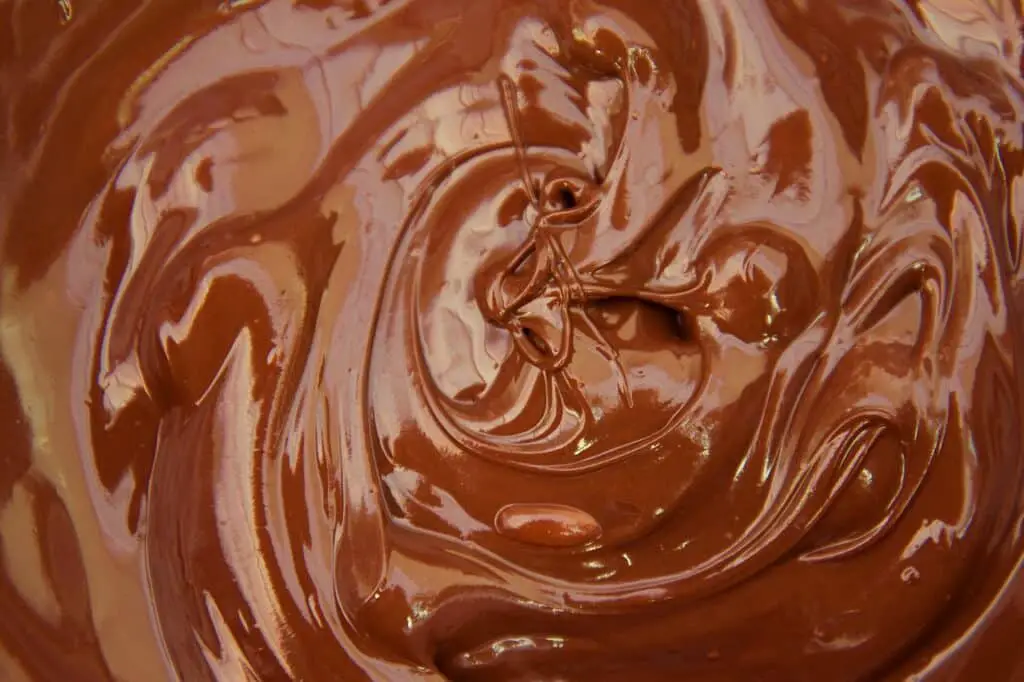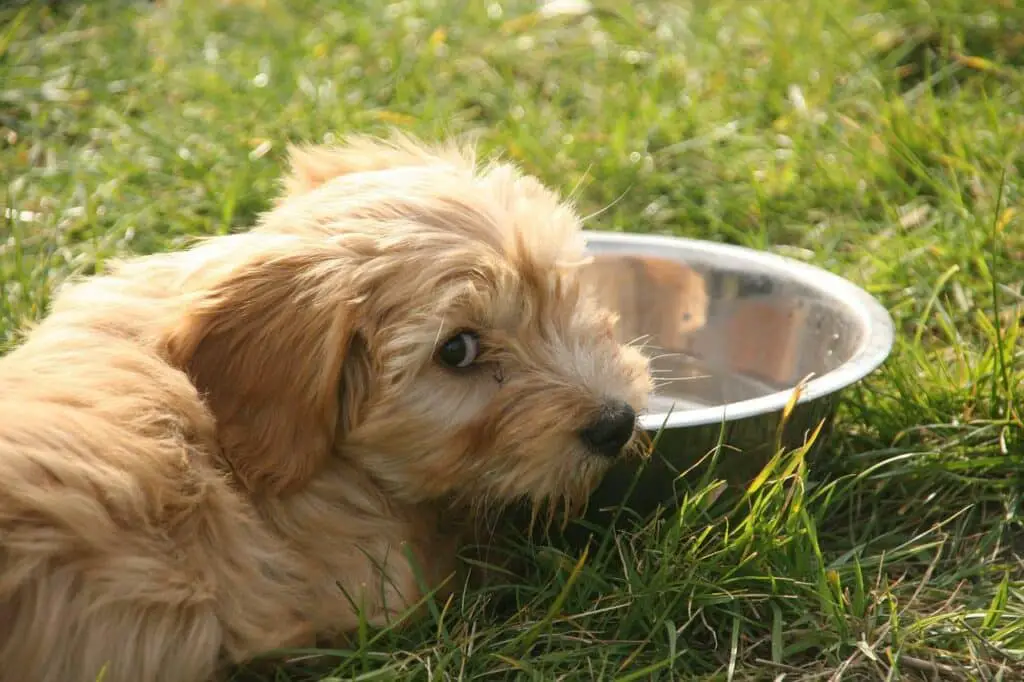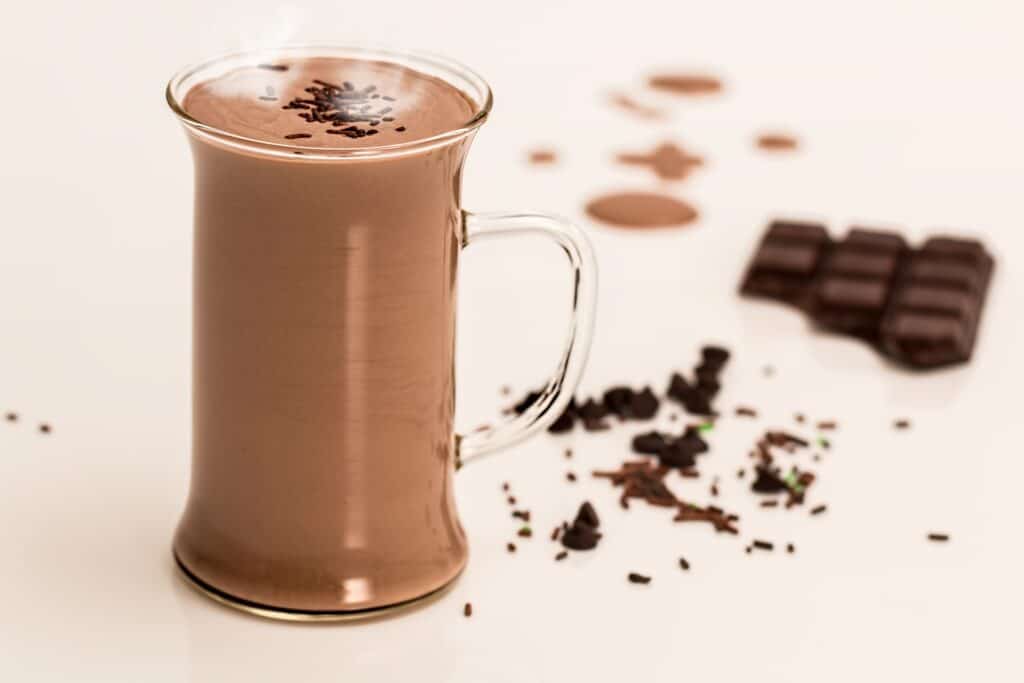Dogs are our best friends.
We depend on them for protection and even comfort in times of need.
As a result, it’s only natural to want to give them something sweet and yummy.
For instance, you may wish to introduce chocolate milk to them, mainly because it’s perceived as healthy.
Yet, it might not be the best thing to do if you want their health intact for a long time.
So, can dogs drink chocolate milk?
No, chocolate is bad for dogs.
Chocolate milk is more trouble than it’s worth. It contains methylxanthines like caffeine which are harmful to dogs.
Methylxanthine can cause vomiting and diarrhea and increase their heart rate, which can be dangerous for them.
Plus, many adult dogs have problems digesting milk, which can cause bloating and discomfort.
This article will help you sort out the most common questions related to the safety of chocolate milk for dogs.
It’ll also give you some great ideas for healthy alternatives to chocolate milk for your dog.

Is Chocolate Milk Safe for Dogs to Consume?
Chocolate milk may be a tasty treat for you, but it’s not safe for dogs to consume.
Your pup is better off drinking a glass of water than they are guzzling down a cup of chocolate milk.
It’s not just because of the sugar content: chocolate can even aggravate dogs’ gastrointestinal disorders.
That’s right: that sweet treat your furry baby receives often could be slowly killing them.
Chocolate milk is made from cow’s milk and cocoa powder.
The fats and carbohydrates in it can cause diarrhea, vomiting, and other digestive problems in dogs.
This sugar and fat can also cause obesity or diabetes if consumed often.
Chocolate milk also contains caffeine and theobromine.
These stimulants can affect a dog’s heart rate or blood pressure even in small amounts.
This shows dogs that have consumed chocolate milk can be sick for days and may need veterinary attention.
So keep your chocolate milk out of reach of Fido.

How Much Chocolate Milk Will Hurt a Dog?
Dogs of different sizes react differently to chocolate milk due to varying tolerance thresholds.
However, while milk chocolate is particularly harmful to dogs, dark and semi-sweet chocolates can also be a trouble.
It only takes one teaspoon of cocoa powder or dark chocolate to give your dog a case of nausea, vomiting, and diarrhea.
In addition, any amount of cocoa powder or dark chocolate over 0.5 ounces per pound of body weight can lead to poisoning in dogs.
The severity and duration of the symptoms vary depending on the type and size of your dog.
Some dogs show signs right after ingesting milk chocolate, while others don’t show any effects until 12 hours later.
What Happens If A Dog Licks Chocolate Milk?
The occasional lick of chocolate milk won’t hurt your pet.
However, if your dog takes a significant amount, it will cause gastrointestinal problems.
The chocolate in the milk is a stimulant and can make your pet feel a little lightheaded or even nauseous.
Caffeine and theobromine can also affect heart rate and blood pressure in dogs.
So if your dog ingests a large amount of chocolate milk, it may need medical attention for its cardiovascular system.
Vomiting, diarrhea, and restlessness are the most common symptoms.

What Happens if a Dog Drinks Chocolate Milk?
Chocolate milk is high in sugar and fat.
For this reason, it can cause a sugar high, followed by a sugar crash, which can lead to behavioral issues in dogs as they get older.
Additionally, chocolate poisoning in dogs can result.
If this happens, it may even lead to death.
The amount of chocolate milk your dog consumes can determine how quickly they get sick and the symptoms experienced.
Here’s the lowdown on the symptoms you can expect if it happens:
- Diarrhea
- Vomiting (which may include blood)
- Muscle tension
- Seizures
- Restlessness and hyperactivity
- Incoordination
- Increased heart rate
- Rapid breathing
- Increased heart rate
Smaller dogs are more susceptible to chocolate toxicity than larger breeds.
Thus, pay attention to how often you give them any cocoa treats.
Get your dog to the vet immediately if you suspect he has eaten chocolate and is having seizures.
What to Do if My Dog Drinks Chocolate Milk?
When you have had to handle a dog who has ingested chocolate milk, you know how terrifying it can be.
You would not want to add to the problem by trying to fix it yourself.
Luckily, your pup can recover from a chocolate milk binge with some help from you.
Here’s what you need to do:
Observe him for signs of illness
Your dog may vomit or have diarrhea after drinking chocolate milk.
In that case, take them to the vet for treatment immediately.
These symptoms could be due to something more severe like food poisoning or intestinal blockage.
Keep an eye on his energy level
After drinking chocolate milk, your dog may run around like normal.
However, if they seem lethargic, sleepy, or even worse, display uncharacteristic aggression, immediately take them to the vet.
This could mean he has consumed too much sugar and needs immediate medical attention.
Prevent your dog from drinking chocolate milk again
Put away all chocolate products immediately after use.
If you have kids around the house, ensure they know that chocolate is off-limits for dogs.
Avoid inducing vomiting or giving any other medications.
Your vet will tell you what treatment is suitable for your pet based on their symptoms and condition.
Alternatives to Chocolate Milk for Dogs
Chocolate milk isn’t the best idea for your dog, and it could cause harm to him.
Yet, if you want to give your dog something besides water, there are many better options.
These include:
Feed them with soy milk or almond milk.
These two alternatives provide the same nutritional value as chocolate milk but are often lower in
lactose content than cow’s milk.
This can help your pup better digest the treat.
However, for dogs with allergies, avoid both soy and almonds.
Other healthy options include Homemade pumpkin puree and plain rice milk.
If you’re looking for a healthier alternative to chocolate milk, the above options should do the trick.
Even if you decide against them, at the very least, don’t give chocolate milk to your dog at all.
Watch for your dog’s reaction when giving them alternative beverages.
If they get sick, stop feeding them and see if you can find any other brands.
Conclusion
While chocolate milk is safe for human consumption, the same can’t be said for dogs.
Chocolate contains certain compounds, such as caffeine and theobromine, harmful to dogs, even in small amounts.
Contact the vet immediately if you ever suspect your dog might have consumed too much of it.
Your dog’s life could be at stake.
Moreover, keep an eye on your dog when you have chocolate in the house (no matter what form it is), and keep these tasty treats out of reach of any curious noses nearby.
- What Dog Breeds Have Pink Skin? - March 24, 2023
- What Are the Most Inspiring Dog Breeding Quotes? - March 20, 2023
- Can Pheromone Spray Help Improve Dog Breeding Results? - March 19, 2023








